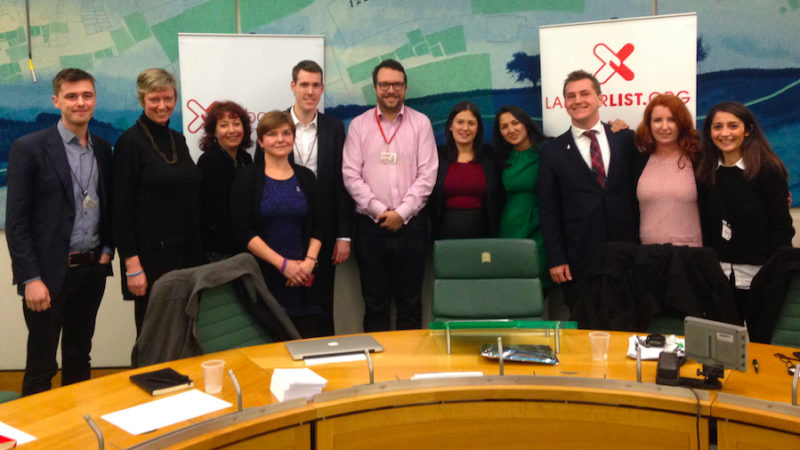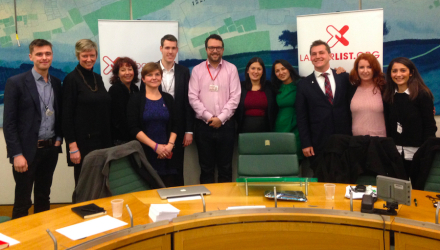

On Monday evening Lisa Nandy MP gave the LabourList Christmas Lecture to launch her pamphlet “Our Labour Our Communities” – you can download the pamphlet here. Here’s the text of that lecture:
We’ve got five months to go until the most important General Election in a generation.
And over the last year, as I’ve spent time with Labour candidates meeting and listening to people in communities as diverse as Brighton, Norwich and Calder Valley it seems to me the overwhelming mood, across a range of income and social backgrounds, is one of anxiety and a feeling of insecurity.
People are frightened, and they have reason to be.
Deep cuts have left many of our most valued public services on their knees – social care, emergency health services, fire and rescue – and those that staff them demoralised and disempowered.
And this recovery we were promised has been built on zero hours, dead end jobs and a revolving door of unemployment. As private companies have made huge profits out of benefit sanctions, charities have been left to pick up the pieces and criticised, threatened or gagged when they speak out about the social consequences of these choices.
Lengthening queues at food banks, the British Red Cross launching an emergency appeal to feed and clothe families in one of the richest countries in the world. And behind the statistics and the headlines are people left feeling utterly humiliated.
The social consequences have huge implications for our communities: acute for some, frightening for many. Rising malnutrition, children being taken into care, worsening rates of domestic violence, and more and more people seeing their lives ripped apart by loan sharks.
Many of the candidates who wrote for this book talked about why they came into politics. It was the spectre of a government who actively drove apart my friends, family and community in Manchester that made me political. And now, we’re here again. Policies like the bedroom tax and benefits cap moving people miles from their communities. Driving a coach and horses through the relationships sustain people, at the very time they need them most.
Four short years since we were promised the Big Society and this is what it looks like.
And as the political debate has become more toxic it’s unsurprising that so often on the doorstep that rage is channelled not at the people who are making these choices, but at immigrants, benefit claimants, Europe, young people.
It’s gone hand in hand with attacks on those civil society institutions – charities and trade unions that are a vital part of our social glue. They act as a buffer between individuals and the state. They define us as we define them.
In our communities, it’s tearing people apart and threatening the social fabric. It’s only been four years since the general election but so much of the legacy of the last government has been virtually wiped out. 1 million children out of poverty, tackling long term youth unemployment, major advances in equality – for women, BME groups, those with disabilities. How bleak the picture looks now.
At the root of this, as so many of the candidates recognise, is vast inequality in power – money, voice, influence – in this country. Only politics can change it.
But at the time people need politics most, the political debate is at its most toxic for decades.
The answers from UKIP are simple. Hark back to an idealised past. One where women, ethnic minorities, gay people have little or no worth. And as Polly says in her chapter, with no thought to the horrendous economic consequences of becoming a small-state free-market island, a low-rent sweatshop on the edge of Europe.
While the Tories take us to a laissez faire future based on competition, individualism, fragmentation, and a handful of people thriving at the expense of the rest of us. It’s a future based on values I utterly reject, and it’s unworkable to boot.
But it doesn’t have to be like this.
This book tells the story of a different future based on the communities are candidates live and work in. Where, as Josh shows, we draw on the talents in every community, working to give communities real power, recognising that where economic resources are scarce, social resources are often abundant. Or as Nancy argues, where we respect people’s dignity and work at work, building on the potential people have not problems they pose. So that, as Sophy argues, today’s teenagers have a chance, and where, as Matt so convincingly says, we don’t have to fear old age.
Only Labour can give people hope.
But look at the size of our challenge. Everywhere politicians turn we find anger and despair, that ‘sheer hopelessness’ that Amina talks about her chapter. Too many people given up hope not just in politicians but in politics itself and the power of politics to change things.
But anger isn’t apathy. Wherever I’ve been in this country people couldn’t care more. And so we have to square up to this challenge.
When I was reading these essays I cast my mind back to five years ago, when I was fighting to become Wigan’s MP and in the wake of the expenses scandal, more than that, I was fighting just to get a hearing. My generation of politicians has done much to get that hearing: whether it’s Steve Reed elected to Parliament off the back of a radical shake up of youth services in Lambeth that handed power to the boroughs young people. Stella Creasy’s circular firing up squad empowering young women with the confidence to challenge and change, Gloria De Piero’s tour of jazz dance classes and coffee mornings to find out why people hate politicians, or – my personal favourite – Alison McGovern basing herself in the pub for an entire summer.
Five years ago it was important to look back over 13 years, to remember the strengths of our offer in government and to understand how Labour had come to lose the trust of such a large majority of the electorate. To listen and learn in the wake of the worst defeat in 100 years.
But that was 2010 and we’re not there now. Since I stood in the shoes of these candidates, hoping to enter Parliament for the first time, things have changed beyond almost all recognition. 1930s levels of spending, 1950s levels of inequality, 1980s levels of anger and despair. The time for reflection is over. The future belongs to those who, armed with lessons from the past, look relentlessly forward.
And that’s why, as we face the most, important general election in a generation, and a bleak future that only Labour can change, the challenges facing this generation of politicians is immense.
But read these chapters and you’ll find people who can see so clearly that we need a new compact, the days of command and control from the centre are dead. This generation is determined to break down the barriers between us and them. They see politicians as catalysts in their communities, for the talents and energies there, beating down the doors of Westminster determined to drag their issues onto the Westminster agenda. That’s why Arnie Graf was such an inspired choice for the foreword.
It’s a new deal, based on values like humility and respect, which as Sarah notes, are too often absent from the political arena. It will change because it has to change.
We could have called this book the Emperor’s new clothes.
Why? Because national politics can and should set the framework, as Louise argues, equal distribution of power, a fair economy, fair pay, where people have the time, confidence and resources to take part – as Wes said it can be as simple, but revolutionary, as ensuring every child starts school on a full stomach.
But for the big challenges we face, loneliness, isolation, hopelessness, there are no levers in Whitehall. Clive acknowledges this in his piece, the need for big picture reckoning with the banks, but even here he tells us, this needs to come from the bottom up. Credit unions, communities finding their own solutions and government there as a partner, walking alongside them every step of the way. It’s a lesson you could so easily apply to public services, humanising.
If our challenge in ‘45 was to build. And the challenge in ‘97 was to repair, the challenge in 2015 is to renew. Politics is changing. And quite simply there is no future for political parties who don’t understand and embrace this.
It’s hard to do. Communities have competing interests, reconciling them, finding own solutions is messy, complicated, frustrating and time consuming.
But Labour’s in a unique position. It’s not just that we’re the only party who will offer the change, the only major force in British politics rooted in a commitment to social justice, but it’s also that we’re the only force who can. The only major party founded from our grassroots. Mutual aid, trade unions, cooperatives, it’s in our DNA. It runs right the way through the last century, from Attlee, to Michael Young to the work Jon Cruddas is doing now. The welfare state and the NHS. It was only ever as strong as the sum of its parts. We’re starting to remember it again and not before time.
Because if we get this right the energy, talent, passion and strengths in our communities can be directed not inwards, not to feeding and clothing children in one of the richest countries in the world but to unlocking that ambition. Just think what we could achieve.
Our choice is the country’s choice. Do we allow ourselves to be ushered into a future we don’t want and don’t like, characterised by zero hours contracts, and a shrill sour hopeless politics that drives us apart. Or do we seek to shape and own that future, to shape it according to our values – social justice, mutuality, equality and common endeavour? There is only one choice, and the candidates here today give me hope not just that we’ll choose the latter path, but that by doing it together, the hard, messy way, we can build a change that has deep roots, a change that lasts.
Lisa Nandy is the Labour MP for Wigan and Shadow Civil Society Minister. You can read our latest pamphlet “Our Labour Our Communities” – edited by Nandy – here.




More from LabourList
‘As metro mayors gain power, Labour must tighten political accountability’
Letters to the Editor – week ending 22 February 2026
‘The coastal towns where young people have been left behind by Whitehall’